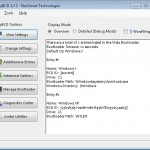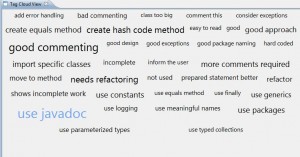Nasty Class loader issue: “java.lang.LinkageError: loader constraint violation: loader previously initiated loading for a different type…”
Posted by Steve in Eclipse Plugins, General, Java, Programming on 2 April 2014
Background
First a bit of background, I am working as part of a team responsible for building a bespoke content management system for educational uses and the back end uses the following technologies:
- Java Tomcat 7.0 server
- Rest Easy 3.0.6.Final
- ElasticSearch 1.0.1
- Google Guice 3.0 for dependency injection
- Eclipse Kepler Build 20130919-0819
- Counterclockwise (Clojure plugin For Eclipse) 0.20.0 & 0.24.1.STABLE001 – This becomes important later even though I am not using it really.
The problem
Now to describe the problem. For some reason after integrating ElasticSearch with our project a nasty error as seen below started happening (and breaking the whole site at runtime when running within eclipse):
SEVERE: Servlet.service() for servlet [jsp] in context with path [/rutherford-server] threw exception [Filter execution threw an exception] with root cause
java.lang.LinkageError: loader constraint violation: loader (instance of org/apache/catalina/loader/WebappClassLoader) previously initiated loading for a different type with name "javax/servlet/http/HttpSession"
This problem seemed to refer at a random place in our code in the stack trace. This random place had previously worked (and is totally unrelated to the Elastic Search stuff I was working on) in my case it occurred in a User Manager class that deals with sessions (hence the reference to HttpSession). The elastic search stuff didn’t have anything to do with the user manager or even use the HttpSession class as far as I was aware but seemed to trigger the error when the code for the elasticsearch java api was inserted.
Read the rest of this entry »
Fixed: iPod Crashing iTunes & Restore Error – iPod Classic 160GB
Posted by Steve in iPod / iTunes on 26 March 2011
Symptoms:
To Solve iTunes Crashing Problem:
When the device was first given to me I formatted it using FAT32 filesystem (iTunes would crash and I would not be able to use the restore button). I reformatted it using gparted in ubuntu because Windows 7 would only let me use exFAT – this is no good.
After formatting the device it would no longer crash iTunes so I could then try to restore it using the correct iTunes restore button. Unfortunately, the restore would fail and the following error would be given: iPod could not be restored. An unknown error occurred 1439.
To Solve iPod restore error (iPod could not be restored – An unknown error occurred 1439.)
The next step which took me ages to figure out was to use a windows XP virtual machine to install an old version of iTunes. After iTunes was installed on the XP box I was able to restore the iPod as normal.
My main computer was running windows 7 64bit and iTunes 10. – This configuration would not restore the iPod and would always have the 1439 error.
The windows XP computer was running 32bit windows and iTunes 9.2.1.5 – this worked correctly and the iPod appears to be fixed.
Eclipse Plugin Development: Wrapping Text In a Label
Today I was having trouble wrapping text in a label on an SWT shell in an eclipse plugin.
I found a useful guide that explains what was going wrong. It can be found here.
The problem was I hadn’t defined a widthHint for the grid data object. This is apparently used by the label component to work out whether it needs to wrap or not.
SSH Port Forwarding Guide
This is a good Guide. for setting up port forwarding with putty and squid.
Eclipse Plugin: Listening to Marker Deletions
Posted by Steve in Eclipse Plugins on 13 August 2009
Today I was desperately trying to figure out how to get eclipse to tell me when a Bookmark had been deleted, so that I could update my plugins internal data representation.
I found lots of api’s which was all well and good but finding a code example was a lot harder. Also the guys on the irc channel were too busy to help, so I kept searching.
It turns out that you need to fiddle with the IResourceChangeListener and IResourceDeltaVisitor to traverse a delta (basically a tree representation of all the changes that have just occurred) and look for your bookmarks.
Below is example code for creating a listener, visitor and how to attach it to the workspace as a change listener.
// this listener deals with handling changes to markers.
private static IResourceChangeListener markerListener = new IResourceChangeListener() {
private MarkerChangeVisitor fVisitor = new MarkerChangeVisitor();
public void resourceChanged(IResourceChangeEvent event) {
IResourceDelta delta= event.getDelta();
if (delta != null)
{
try {
delta.accept(fVisitor);
} catch (CoreException ce) {
}
}
}
};
Eclipse Plugin Tag Cloud
Posted by Steve in Eclipse Plugins, Tagging / Folksonomies on 12 August 2009
I got fed up looking for a nice version of an eclipse tag cloud so instead I made my own.
Its simple but effective.
You can download the archive here. Or look at the code below.
eclipseTagCloud.zip
All you should need to do to display it is make a viewpart and then write something like.
// pass the tag cloud generate a data structure like the following
// example code
ArrayList al = new ArrayList();
al.add(new Pair("tag 1", 3);
al.add(new Pair("tag 2", 6);
// create the tag cloud generator
EclipseTagCloudGenerator tclg = new EclipseTagCloudGenerator(al);
tclg.setMaxTags(35); //set max tags to display (by default will display most frequent)
tclg.setScale(2); //set scale to increase font by
tclg.generateTagCloudDisplay(comp, tclg.getTagCloud()); //generate the tag cloud and attach it to the parent comp object
Hello world – My first post
I am currently a PhD Candidate studying Technology Enhanced Learning at Durham University. Have a little look at my website for more info.
More specifically I am looking at folksonomies and programming to see if there are any applications that could be used to improve undergraduate programming courses.
I have started this blog to help other coders who are programming on similiar things to me. Primarily, for things that I had problems with or got frustrated with, when I couldnt find help online or on irc.

